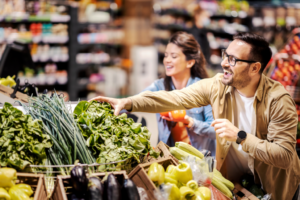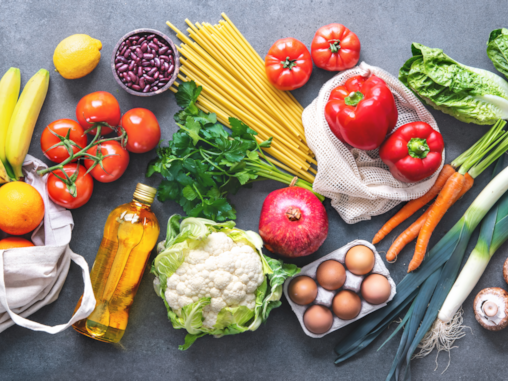I’ve been known to be a bit of a foodie by those who know me, and I certainly do enjoy my food. Napoleon realised there was a lot more to food than just subsistence and nutrition when he said, “An army marches on its stomach”. Enjoyment of our meals can help us by releasing our happy hormones, dopamine, endorphins, and serotonin. Sharing a meal with a loved one can also boost our oxytocin levels. So, having well balanced diet will help with our stress levels, our daily motivation, and improve our sense of wellbeing.
If what we eat is an essential part of our lives, we should know what goes into it and where it comes from. The food industry utilises some of the most cost driven manufacturing processes, where saving a fraction of a penny on an ingredient can add huge amounts to company profits. Cost reduction is one of the main driving forces in producing manufactured and processed food. These products are developed by Food technologists who will minimise expensive ingredients and maximise cheap bulking or flavour enhancers. Then their marketing departments will highlight the expensive ingredients in their advertising campaigns to make the product seem irresistible.
Gums
Many processed food products are bulked with guar gum and xanthan gum, which most people have never heard of. Guar gum is a carbohydrate that is milled from the guar bean, it is low in calories and high in fibre. It is used in many processed foods including gluten-free baked goods. Xanthan gum is made from fermented sugar to create a soluble fibre that the body can’t break down. It is used in processed and gluten-free foods to thicken and stabilise. However, overuse of xanthan gum can lead to constipation. The industry is very keen to promote these gums as being healthy but in reality, it is unlikely that guar and xanthan gums give any nutritional or health benefits.
It’s all in the packaging.

Supermaket Shopping
At least when I visit my local supermarket, I can read the labels on the products and make a choice about what is good and what is not. Unfortunately, in restaurants and takeaways, that option is not always available. But to me, the healthy or sustainable choice is not limited to the ingredients.
Everything we eat has been on a journey, from the farm, factory, distributor, wholesaler, and shop. Even organic food goes through many segments of a journey. Each segment consumes energy, creates waste, and can even reduce the nutritional value and quality our food. So, when I read the ingredients, I also check the origin. Do we need to buy apples from New Zealand, asparagus from Peru, or French beans from Kenya? We can do more for the planet by eating seasonal produce that is locally sourced. Even if you live in a big city, something produced in East Anglia will have consumed fewer food miles than something from Morocco.
It’s not just the food miles or destruction of natural habitat that damages the environment. Our demand of out of season foods drives virtual water export. Farming is the biggest consumer of water and can put a massive demand on local ecosystems. Water security is fast becoming one of the world’s big issues. If a country is using more water for agriculture than it produces, i.e., through rainfall, rivers, lakes, and aquifers, then there will be a negative impact on the environment that may result in famine.
Organic is good, isn’t it?
To consume organic food is in our blood. It is the natural way that’s best for us and best for our health and the environment. But even buying organic food, it’s still “buyer beware”. Not all organic food is as organic as we think. Sometimes the reality does not measure up to the image in our minds. A scan of the ingredients of many organic ready meals shows the inclusion of non-organic ingredients as well. Some ready meals are charging nearly £14 per person! The small print ingredient lists use an asterisk to denote the non-organic elements, yet the word “Organic” has the most prominence on the packaging. Organic food production still is responsible for food miles and virtual water export. A lot of organic farming is dependent on plastic either as a mulch or polytunnels to protect the crops. The Use of plastic has a huge environmental impact. Although many organic farmers try to encourage bees and pollinators, there are many that do not.
Respect for food
We cannot assume that those who produce our food have the best interests for the planet, consumer, or produce at heart. The demands for feeding a growing population, cutting supermarket prices and grain shortages due to war are putting increasing pressure on food production and prices more than ever. It doesn’t matter if food is organic, vegan, vegetarian, or any other food culture, standards and ethics behind the label are quite often less than we are led to believe.
We have more control over what we eat by preparing our meals from fresh produce. Cooking from scratch doesn’t have to be time consuming or more expensive. In fact, with a little knowledge, it can work out much cheaper. I have a rule for weekday meals that preparation time should be no more than 30 minutes.
In terms of Pure Body Fix®, I often ask about food and diet during my consultations because of its impact on wellbeing, performance, and fitness. While sports people need to be more in tune with their diet, we all need to understand the benefits of eating healthily. I don’t promote any specific food lifestyle choice because everyone has their own values, but we owe it to ourselves to know how and where our food comes from.
An active life with a healthy diet coupled with regular massages is a great way to boost your long-term wellbeing by increased fitness, protecting your vital organs from disease and lowering stress.






